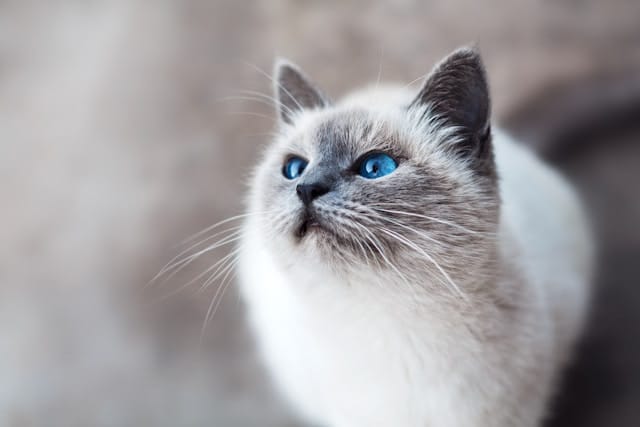For many cat owners, the well-being of their furry companions is a top priority. When these beloved pets are diagnosed with a condition like hyperthyroidism, it often leads to a scramble for information. What causes this ailment? How will it affect your cat’s daily life? And most importantly, how can your cat’s diet help manage this condition? In this article, we delve into the key diet considerations for a cat with hyperthyroidism, offering expert insights and practical advice to help you and your pet navigate this challenging situation.
Understanding Hyperthyroidism in Cats
Before we delve into the dietary changes necessary for managing feline hyperthyroidism, it’s important to comprehend the nature of this condition. Hyperthyroidism is a common disease in older cats, characterized by an overactive thyroid gland that produces an excessive amount of thyroid hormones. This hormonal imbalance can cause a range of symptoms, including weight loss despite increased appetite, increased thirst and urination, vomiting, diarrhea, and hyperactivity.
Cela peut vous intéresser : How to Set Up a Safe and Stimulating Play Area for Young Puppies?
The underlying cause of hyperthyroidism in cats isn’t entirely understood, but it’s believed that exposure to certain chemicals and food packaging materials may play a role. With this sound understanding of the condition, you’re better equipped to tackle the dietary modifications that come next.
The Role of Diet in Managing Feline Hyperthyroidism
Diet plays a crucial role in managing feline hyperthyroidism. By controlling what your cat eats, you can influence the level of thyroid hormones in their body, helping to alleviate some of the symptoms of the disease. While medication and other treatments are often necessary, dietary changes can make a significant difference in your cat’s quality of life.
Sujet a lire : How to Choose the Right Type of Bird Feeder for an African Grey Parrot?
The most common dietary approach for cats with hyperthyroidism is a low-iodine diet. Iodine is an essential component in the production of thyroid hormones; by limiting its intake, you can help reduce the overproduction of these hormones. Commercially prepared low-iodine cat foods are available, but it’s essential to consult with your vet before making any drastic changes to your cat’s diet.
Choosing the Right Foods for Your Hyperthyroid Cat
Now that we’ve established the importance of a low-iodine diet, let’s delve into the specifics. What exactly should your cat eat, and what foods should be avoided?
The first rule of thumb is to avoid fish-based cat foods. Fish is naturally high in iodine, and while it can be a healthy part of a normal cat’s diet, it’s not suitable for cats with hyperthyroidism. Instead, opt for chicken, turkey, or rabbit-based foods, which are typically lower in iodine.
Whole grains, fruits, and vegetables can also be beneficial. While cats are obligate carnivores, meaning they require a diet primarily made up of meat, these foods can provide essential nutrients and help to bulk up your cat’s diet, making them feel fuller. However, they should be used sparingly and under the guidance of your vet to ensure your cat is still getting enough protein.
The Importance of Consistent Monitoring and Veterinary Guidance
While dietary changes can make a significant difference, managing feline hyperthyroidism isn’t a one-size-fits-all approach. Each cat is unique, with different dietary needs and responses to treatment.
Regular veterinary check-ups are crucial in monitoring your cat’s progress and making necessary adjustments to their diet and medication. Blood tests will provide an accurate picture of your cat’s thyroid hormone levels and help your vet determine whether the dietary changes are making a difference.
Furthermore, keep a close eye on your cat’s behavior and physical condition at home. Changes in weight, appetite, and overall demeanor can provide valuable insights into their health. Be sure to communicate any observations with your vet — they are crucial members of your cat’s healthcare team and can provide the guidance and support you need during this challenging time.
Managing a pet’s health condition can be daunting, but remember, you are not alone. With a balanced, carefully planned diet and regular veterinary care, you can help your feline friend live a happy, healthy life despite their hyperthyroidism. Here’s to your cat’s health and wellbeing – and to the many more loving years you have to share together!
Navigating Commercial Cat Foods and Homemade Diets
Being a cat parent means navigating the world of commercial pet food options or sometimes opting for homemade diets. Commercial cat food often provides complete and balanced nutrition for your pets. However, it’s vital to choose a brand that caters to the specific needs of a cat with hyperthyroidism. Look for brands that explicitly state a low iodine content. Don’t rely solely on the ingredient list, as it might not provide complete information about iodine levels.
More and more pet parents are also considering homemade diets. This gives you complete control over the ingredients and therefore, the levels of iodine your cat consumes. If you decide on this route, it is essential to collaborate with a veterinary nutritionist. They can help ensure that your homemade diet meets all the nutritional needs of your cat beyond just controlling iodine intake.
However, utmost care should be taken while preparing homemade diets. Incorrect proportions of ingredients could lead to other health issues. Also, cats with hyperthyroidism often have concurrent diseases like kidney disease which may necessitate further diet modifications.
Remember the golden rule: always consult your veterinarian or a veterinary nutritionist before making any significant changes to your cat’s diet. It’s not just about managing iodine intake; it’s about comprehensive nutritional management to ensure your cat’s well-being.
The Role of Water and Hydration
Water and hydration play a vital role in every cat’s health, but it becomes even more important when dealing with a disease like hyperthyroidism. Cats with hyperthyroidism often experience increased thirst and urination. Therefore, always ensuring access to fresh and clean water is critical.
Increased hydration can also aid in managing other symptoms like vomiting and diarrhea, common in hyperthyroid cats. In some cases, your vet may recommend a wet diet over dry food to help increase your cat’s water intake.
Also note, if you are feeding canned food or a homemade diet, adjust the water content carefully. Too much water can dilute the nutrients, making it harder for your cat to get the nutrition they need.
Conclusion
Being a pet parent to a cat with hyperthyroidism can be challenging, but with careful dietary management and consistent veterinary care, you can ensure your furry friend leads a comfortable, fulfilling life. The key is to understand the role of iodine in this condition and to manage its intake diligently, whether through commercial cat food or a homemade diet.
Hydration management is equally important, with an emphasis on ensuring your cat has constant access to fresh water. Regular vet check-ups and constant monitoring of your cat’s health and behavior will provide the best insight into how well your cat’s condition is being managed.
Remember, every cat is unique and there might be a need to adjust and re-adjust until you find the right balance that works for your pet. But with love, patience, and persistent care, you can ensure that your cat with hyperthyroidism continues to have a happy, content life. At the end of the day, it’s about giving your cat the best care and love they deserve, because they surely give us more than we could ever ask for.











